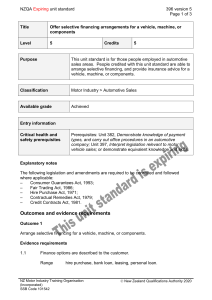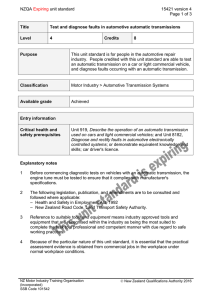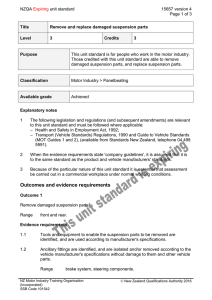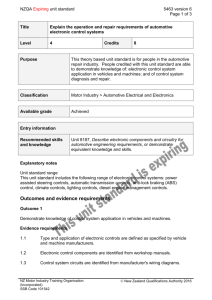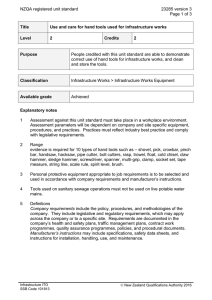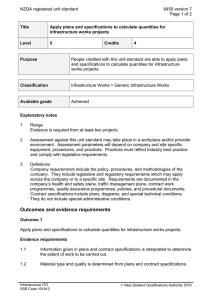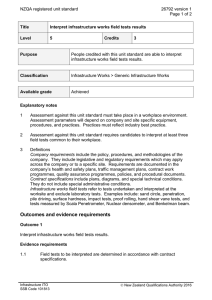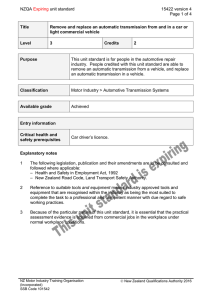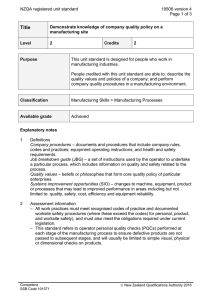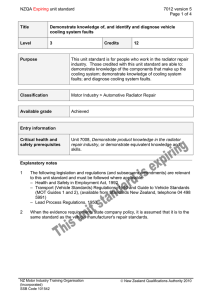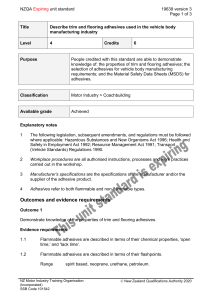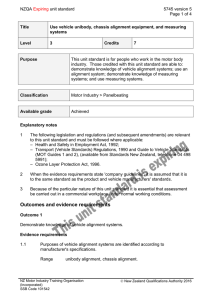NZQA unit standard 7013 version 5
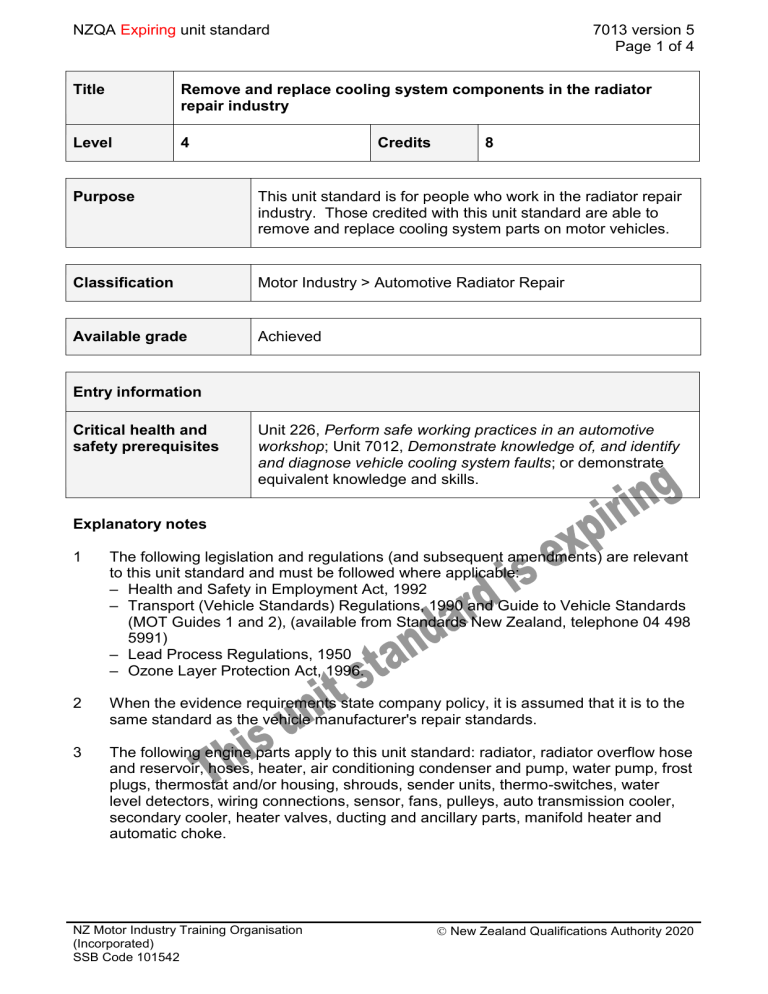
NZQA Expiring unit standard
Title
7013 version 5
Page 1 of 4
Remove and replace cooling system components in the radiator repair industry
4 Credits 8 Level
Purpose This unit standard is for people who work in the radiator repair industry. Those credited with this unit standard are able to remove and replace cooling system parts on motor vehicles.
Classification
Available grade
Entry information
Motor Industry > Automotive Radiator Repair
Achieved
Critical health and safety prerequisites
Unit 226, Perform safe working practices in an automotive workshop ; Unit 7012, Demonstrate knowledge of, and identify and diagnose vehicle cooling system faults ; or demonstrate equivalent knowledge and skills.
Explanatory notes
1 The following legislation and regulations (and subsequent amendments) are relevant to this unit standard and must be followed where applicable:
– Health and Safety in Employment Act, 1992
– Transport (Vehicle Standards) Regulations, 1990 and Guide to Vehicle Standards
(MOT Guides 1 and 2), (available from Standards New Zealand, telephone 04 498
5991)
– Lead Process Regulations, 1950
– Ozone Layer Protection Act, 1996.
2 When the evidence requirements state company policy, it is assumed that it is to the same standard as the vehicle manufacturer's repair standards.
3 The following engine parts apply to this unit standard: radiator, radiator overflow hose and reservoir, hoses, heater, air conditioning condenser and pump, water pump, frost plugs, thermostat and/or housing, shrouds, sender units, thermo-switches, water level detectors, wiring connections, sensor, fans, pulleys, auto transmission cooler, secondary cooler, heater valves, ducting and ancillary parts, manifold heater and automatic choke.
New Zealand Qualifications Authority 2020 NZ Motor Industry Training Organisation
(Incorporated)
SSB Code 101542
NZQA Expiring unit standard 7013 version 5
Page 2 of 4
Outcomes and evidence requirements
Outcome 1
Remove cooling system parts.
Evidence requirements
1.1
Tools and equipment are identified and used according to manufacturers’ specifications are selected.
1.2
1.3
Fault is identified according to company policy.
The viability of repairing and/or replacing parts is identified according to company policy.
1.4 Coolant is drained from system and stored for reuse or disposal of according to legislation and company policy.
1.5 Oil coolers are disconnected and are protected according to vehicle manufacturer's specifications and company policy.
Range connections protected, safe handling and storage of component and oil.
1.6 Air conditioning condenser and heating systems are located, and methods of safe handling and storage of them are identified.
Range pump, pipes, refrigerants, heater, hoses, evacuate system, recover chlorofluorcarbons (CFC).
1.7 Parts to be removed are identified, and are removed according to the manufacturer's specifications, legislation, and company policy, and there is no damage to the parts or adjacent parts or fittings.
1.8 Safe working practices are carried out throughout the task.
Range personal safety, safety to other people, environmental safety; vehicle safety; tool, equipment, and machine safety.
Outcome 2
Replace cooling system parts.
Evidence requirements
2.1 Tools a nd equipment are identified and used according to manufacturers’ specifications.
New Zealand Qualifications Authority 2020 NZ Motor Industry Training Organisation
(Incorporated)
SSB Code 101542
2.6
2.7
2.8
NZQA Expiring unit standard
2.2 Replacement parts are procured according to company policy.
2.3
7013 version 5
Page 3 of 4
Parts are replaced, and are operating according to the manufacturer's specifications and legislation, and there is no damage to the parts or adjacent parts or fittings.
2.4 System is flushed out and bled, and is operating according to manufacturer's specifications.
Range coolant, oil, refrigerant replenished.
2.5 System is tested, and is operating according to vehicle manufacturer's specifications.
Repair is completed in the allotted time according to company policy.
Tools and equipment are put away in their place according to company policy.
Safe working practices are carried out throughout the task.
Range personal safety, safety to other people, environmental safety; vehicle safety; tool, equipment, and machine safety.
This unit standard is expiring. Assessment against the standard must take place by the last date for assessment set out below.
Status information and last date for assessment for superseded versions
Process Version Date Last Date for Assessment
Registration 1 29 May 1996 31 December 2016
Revision
Revision
2
3
14 November 2000
16 October 2003
31 December 2016
31 December 2016
Review 4 25 January 2008 31 December 2016
Rollover 5 19 November 2010 31 December 2016
Accreditation and Moderation Action Plan (AMAP) reference 0014
This AMAP can be accessed at http://www.nzqa.govt.nz/framework/search/index.do
.
Please note
Providers must be granted consent to assess against standards (accredited) by NZQA, or an inter-institutional body with delegated authority for quality assurance, before they can report credits from assessment against unit standards or deliver courses of study leading to that assessment.
Industry Training Organisations must be granted consent to assess against standards by
NZQA before they can register credits from assessment against unit standards.
New Zealand Qualifications Authority 2020 NZ Motor Industry Training Organisation
(Incorporated)
SSB Code 101542
NZQA Expiring unit standard 7013 version 5
Page 4 of 4
Providers and Industry Training Organisations, which have been granted consent and which are assessing against unit standards must engage with the moderation system that applies to those standards.
Consent requirements and an outline of the moderation system that applies to this standard are outlined in the Accreditation and Moderation Action Plan (AMAP). The
AMAP also includes useful information about special requirements for organisations wishing to develop education and training programmes, such as minimum qualifications for tutors and assessors, and special resource requirements.
NZ Motor Industry Training Organisation
(Incorporated)
SSB Code 101542
New Zealand Qualifications Authority 2020
